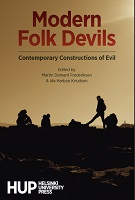Modern Folk Devils
Contemporary Constructions of Evil
Contributor(s)
Harboe Knudsen, Ida (editor)
Frederiksen, Martin Demant (editor)
Language
EnglishAbstract
The devilish has long been integral to myths, legends, and folklore, firmly located in the relationships between good and evil, and selves and others. But how are ideas of evil constructed in current times and framed by contemporary social discourses? Modern Folk Devils builds on and works with Stanley Cohen’s theory on folk devils and moral panics to discuss the constructions of evil. The authors present an array of case-studies that illustrate how the notion of folk devils nowadays comes into play and animates ideas of otherness and evil throughout the world. Examining current fears and perceived threats, this volume investigates and analyzes how and why these devils are constructed. The chapters discuss how the devilish may take on many different forms: sometimes they exist only as a potential threat, other times they are a single individual or phenomenon or a visible group, such as refugees, technocrats, Roma, hipsters, LGBT groups, and rightwing politicians. Folk devils themselves are also given a voice to offer an essential complementary perspective on how panics become exaggerated, facts distorted, and problems acutely angled.;Bringing together researchers from anthropology, sociology, political studies, ethnology, and criminology, the contributions examine cases from across the world spanning from Europe to Asia and Oceania.
Keywords
Public fear; Exclusion; Stigmatization; Moral panic; Otherness; Folk devilsDOI
10.33134/HUP-13ISBN
9789523690554, 9789523690561, 9789523690578, 9789523690547, 9789523690554Publisher
Helsinki University PressPublisher website
https://hup.fi/Publication date and place
Helsinki, 2021Imprint
Helsinki University PressClassification
Legal aspects of criminology
Social and cultural anthropology
Political science and theory
Sociology
Sociology and anthropology


 Download
Download Web Shop
Web Shop